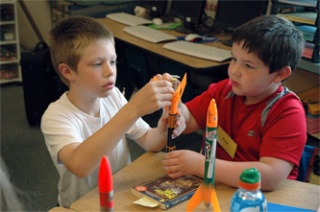TULALIP — When the Marysville Cooperative Education Program at Quil Ceda Elementary found itself without a science specialist this school year, Co-Op third-grade teacher Shawn Jenkins turned to her dad, retired Shoreline School District teacher Ed Orsborn, to help inject some science into the studies of the 48 third-graders taught by herself and Elizabeth Bray at the school.
Orsborn came armed with a uniquely hands-on lesson that Jenkins had enjoyed learning from her dad during her own childhood years and after two weeks of in-class work, Jenkins and Bray’s classes filed outdoors May 26 to test out the results of their labors by launching the model rockets that Orsborn had taught them how to build.
“Back in the 1960s, I was a new teacher in Shoreline and I saw a catalog about model rockets,” Orsborn said. “I investigated it and found out I had to have a pyrotechnic license to be able to buy the engines, since they weren’t sold in hobby shops.”
Orsborn put himself through a workshop to obtain the license, and launched his first model rocket in Shoreline in 1963, albeit under heavy supervision.
“At the first launching, the superintendent, the fire chief, the insurance adjustor, everybody was there, because they weren’t certain that this would be safe,” Orsborn said.
Orsborn wound up proving the safety of the model rockets in an unexpected way, when the first one exploded on the launching pad.
“There were no significant metal parts,” Orsborn said. “It just burst into flames, because the engine was packed wrong, and that proved, hey, these things are not bombs.”
Even though Orsborn retired from teaching 16 years ago, he’s continued to volunteer his services as a “rocketeer” to the students of Shoreline, and any other school district that will have him.
“I’ve been doing it just for the fun,” Orsborn said. “It’s always been fun.”
“His love of model rocketry was passed on to me,” Jenkins said. “I remember going and watching his launches at his school, as a youngster myself.”
This marks the first year that Co-Op students have studied model rocketry.
“This year, we really had to figure out what are we going to be doing, to really stimulate our kids’ thinking, and to get them into that whole inquiry and hands-on love of science” Jenkins said. “In my mind, what better way than model rocketry?”
Orsborn guided Jenkins’ students, which included his own granddaughter, through a step-by-step process, from ordering their model rockets through installing their engines.
“That’s been very painless, because he’s been there for us,” Jenkins said. “A lesson on safety was where he began and then he taught them all about what rockets are, how they move, what engines are, all their different parts and what happens when the rocket launches. Down to the chemically treated toilet paper, every piece of that was taught to them.”
Although the students did face the challenge of gluing small soda straws to their rockets, to mount them onto the rocket launcher, Jenkins observed that the students’ fine-motor skills were more than capable of performing such tasks.
Orsborn believes that his lessons also develop other skills in students.
“These third-graders learn how to follow precise directions, because if they’re not followed, the rocket won’t be made right, it won’t fly right and it won’t work at all,” Orsborn said.
As the students get older, Orsborn pointed out how model rocketry can be used to teach trigonometry, and can even be a competitive sport, by making contests out of how high each student’s rocket can fly. He noted that more complex rockets, with fins made of separate pieces of balsa wood, instead of single pieces of plastic, can teach students valuable lessons in patience.
“We’ve even launched them from underwater, which was a real task because of all the wiring, and that worked out well,” Orsborn said of his experiences with previous groups of students, before saying of the Co-Op third-graders’ rockets, “There’s still some intricate little parts with these ones that had to be put together and they were able to do that. Their excitement was worth every minute of it.”
“The most fun has been watching the rockets take off,” Jenkins said. “That’s always a thrill.”
Co-Op third-grader Sam Scoville has been so fond of the experience that he and his father wound up doing some extracurricular rocketry.
“There were a few mistakes,” Scoville said. “One of our rockets went into the river in Jennings Park, or at least, that’s what we think happened. We launched it twice, and the second time, we didn’t recover it. Losing them is very bad, but there hasn’t really been any frustration at all.”
Scoville repeated several times how much he likes model rockets, from building them to launching them, and seeing their nose-cones pop off so that they can float back down to the ground on their parachutes.
“You should cut a hole in the parachute so it doesn’t drift very far, because if it does you might not find it,” Scoville said. “I like seeing them open up and fall. It just looks like they’re some type of bird, falling like it was shot by a hunter.”
Jenkins thanked both the Co-Op students’ parents and her own father for helping to make the event possible, while Orsborn had another message for the parents.
“I’d just like to tell them that they can now brag that their kids have been rocket scientists since the third-grade,” Orsborn laughed.



